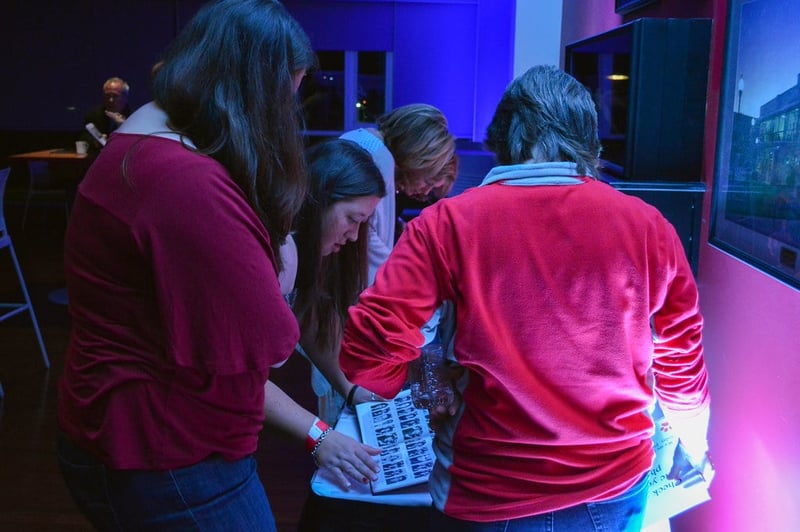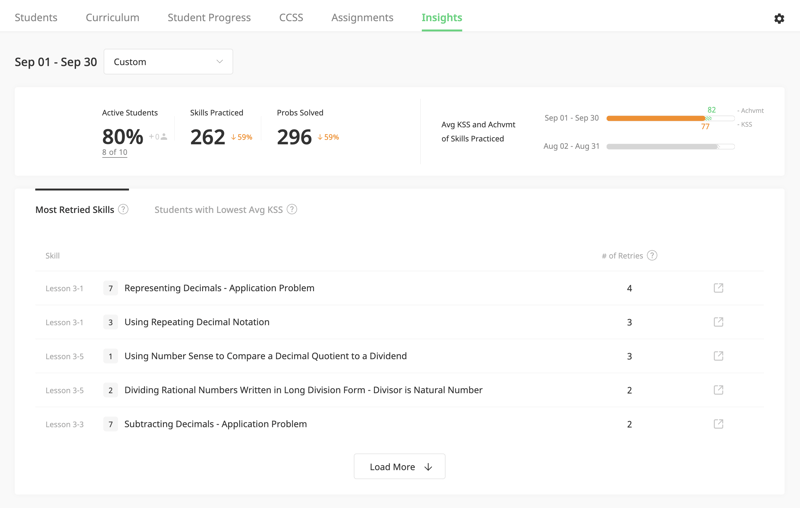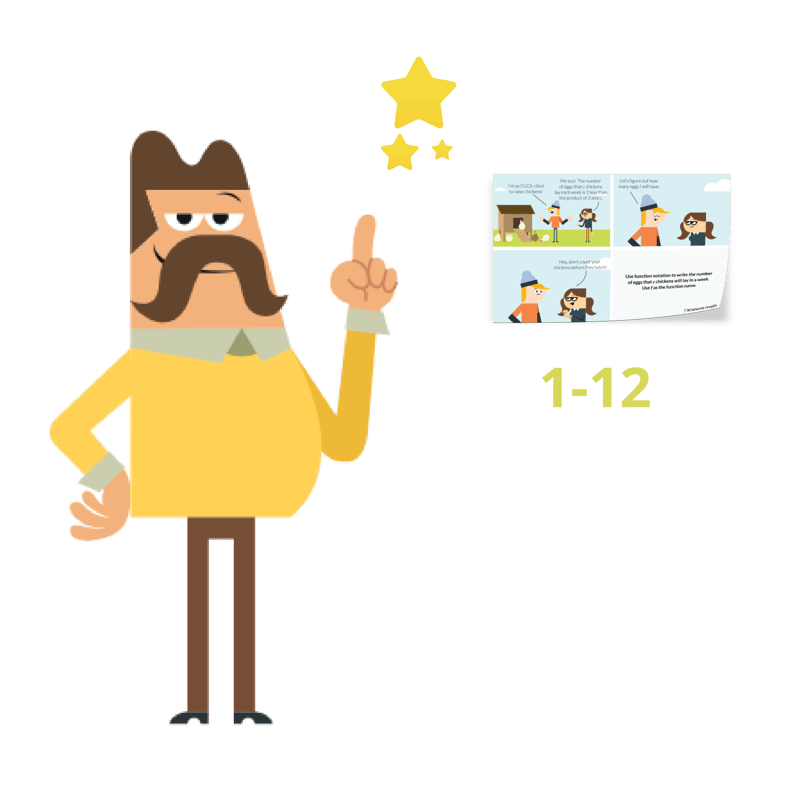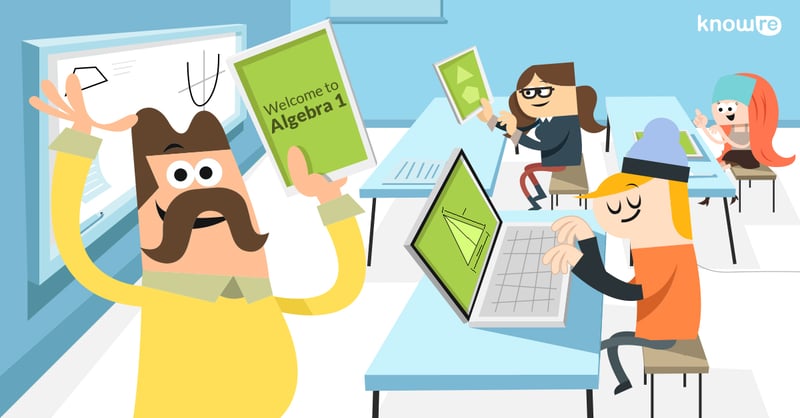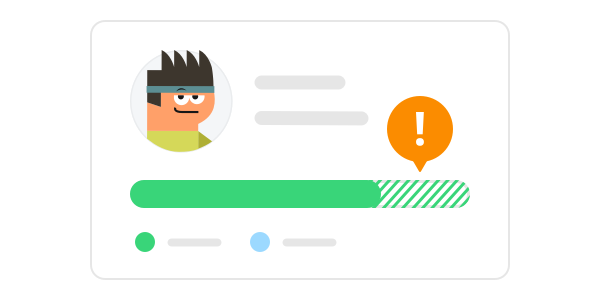We know that some students may struggle to engage in learning. How can teachers foster student engagement? Try setting classroom goals around Knowre Math participation and providing specific, constructive feedback. In this article we will explore 4 different strategies for boosting student engagement. While we will discuss these strategies as they relate to Knowre Math, they can also be used more broadly in the classroom to support overall student engagement in learning activities.
Encouraging and Maintaining Student Engagement with Knowre Math
Topics: Classroom, Student Success, Student Engagement
The Knowre Math Teacher Dashboard is loaded with actionable data to help inform your instruction. Located on the Teacher Dashboard, the Insights tab gives you a look at student activity, overall class performance and progress, and students that need additional support in a chosen date range. You’re also able to see how your class has been progressing for a previous date range. For example, if you are viewing data from the last 30 days, you will also see your class’s average KSS and Achievement for the 30 days before that. This is a great way to see how your class’s performance is trending over time. Data in other tabs give data based on the most recent attempt, while the Insights tab delivers data on all skill and problem attempts during the selected time period. Keep in mind, the Insights tab gives data on lessons and skills students have completed in the primary grade/curriculum for the class.
Topics: Data, Student Success
Common Skills Gaps for Students in Grades 4 through Algebra 2
Each new school year students enter into the classroom with gaps in their prior knowledge. The challenge of how to address those gaps, while simultaneously introducing students to new grade-level standards, is a difficult balancing act.
Many Knowre Math students start the new year off by taking Knowre’s Ready? Check. Go! (RCG) diagnostic. The RCG was created to identify incoming skills gaps by giving students a chance to show what they know on key topics from the previous year (ie. 7th graders take a Ready! Check. Go! focused on 6th grade math skills).
Topics: Students, Classroom, Formative Assessment, Student Success, Teachers
I spend a lot of time talking with teachers about data. Data is at the core of much of what we do at Knowre and it is also at the core of how many of our teachers make instructional decisions in their classrooms.
In most classrooms teachers are the primary collectors and analyzers of data. In a smaller number of classrooms, however, teachers are opening up this process to their students as a way to further engage them in the learning process.
Topics: Personalization and Differentiation, Students, Classroom, Formative Assessment, Student Success, Teachers
How to transition your use of Knowre Math from remote and hybrid to in-person
A large number of teachers began using Knowre Math for the very first time last March. That means that for many the program has only ever been used in remote or hybrid models. As schools across the country begin to shift towards more in-person learning time, you may be wondering about how best to transition your use of the Knowre Math program back into the physical classroom.
Read on for some tips and don’t hesitate to email support@knowre.com if you want 1:1 help making the transition.
Topics: Personalization and Differentiation, Education Technology, Student Success, Math Instruction, Teachers, Schools
This year attendance levels are down and we’re hearing from many teachers that the volume of work being turned in by students who do attend is down as well. Over the past month many new schools have started using Knowre Math to help address the challenge of make up work.
In this article we will explore some ways to use Knowre Math for make up work and specific considerations in order to set teachers and students up for success.
Topics: Personalization and Differentiation, Education Technology, Student Success, Math Instruction, Teachers, Schools, Asynchronous, Remote
What if for a day or week you chose to shift the responsibility of creating assignments to your students?
At this point in the school year, and this point of hybrid/remote/in-person learning, students have a strong sense of the independent learning tools available to them. They very likely also have a sense of what they need as a learner even if they aren’t able to articulate it. Empower students to act on these insights by giving them the responsibility of determining the contents of an upcoming assignment. You can start out small and have students make a one day plan, or challenge students to come up with a week’s worth of assignments for a particular subject area.
Topics: Personalization and Differentiation, Education Technology, Student Success, Math Instruction, Schools, Asynchronous, Remote
As students return to school after winter break goal setting can be a useful exercise in refocusing effort and attention during what can be a challenging transition.
The most effective goals are co-created with students. Co-created goals foster more of a sense of buy in and agency on the part of the student. Students are often told what they need to do so allowing them instead to take part in the goal setting process can go a long way towards increasing engagement.
Topics: Personalization and Differentiation, Data, Education Technology, Student Success, Math Instruction, Schools, Asynchronous, Remote
Three Questions You Can Answer with Data from Knowre Math's Teacher Dashboard
After our November update there is lots of new data available on the Teacher Dashboard. This article dives into three questions that you can answer using this detailed information and also includes ways to use that data to take data-driven action in your classroom to support student learning.
Topics: Education Technology, Student Success, Math Instruction, Schools, Asynchronous, Remote
Best Practices for using Knowre Math during Remote Learning
With many schools across the country pausing in-person learning due to spiking COVID-19 cases, we wanted to take some time to focus on best practices for using Knowre Math within a remote learning environment. If you've already been regularly integrating Knowre Math into your weekly practice with your students you should be able to transition quite seamlessly into using the program for remote learning.
When using Knowre Math in a remote learning environment students should use the program during asynchronous learning time. During times when students and teachers are together the data provided on the Teacher Dashboard can be very helpful in identifying areas of focus for work with individual students, small groups of students, or the whole class.
Topics: Education Technology, Student Success, Math Instruction, Schools, Asynchronous, Remote

